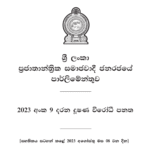Corporate phenomena such as takeover offers—exemplified by Hatton National Bank’s bid for control of the Commercial Bank of Ceylon and the contest between Vanik Incorporated Ltd and Asia Capital Ltd over Forbes Ceylon Ltd—highlight the importance of regulatory frameworks like the Company Takeovers and Mergers Code of Sri Lanka. This code, introduced by the Securities and Exchange Commission of Sri Lanka (SEC), aims to regulate takeover offers and mergers within a defined legal framework. These instances demonstrate the need for a robust system to manage the complexities of corporate control transactions and ensure the protection of all stakeholders involved.
Objectives of Takeover Regulation
The Company Takeovers and Mergers Code of Sri Lanka, established in June 1995, shares similarities with the London City Code on Takeovers and Mergers. Both codes aim to:
- Ensure fair and equal treatment: Protect all shareholders of target companies, regardless of their shareholding size, by guaranteeing equitable treatment in takeover scenarios.
- Provide accurate and timely information: Enable shareholders to make informed decisions by ensuring transparency and access to relevant information.
- Maintain market order: Prevent market disruptions by fostering a stable and orderly securities trading environment.
- Restrict harmful defensive actions: Limit target company management from adopting measures purely aimed at frustrating takeover bids, thus preserving the integrity of the process.
Traditional company law often lacks sufficient mechanisms to protect shareholders, necessitating these regulations. By addressing these objectives, the code bridges the gaps left by conventional governance structures.
The London City Code: A Model of Flexibility
The London City Code, developed in 1969, exemplifies self-regulation in the securities market. Governed by the London City Panel on Takeovers and Mergers, this code relies on voluntary principles and rules. Key features include:
- Flexibility: The Panel applies broad principles and adapts them to specific cases, allowing it to respond effectively to unforeseen situations.
- Fairness: The code incorporates ten general principles and 38 detailed rules, ensuring fairness while allowing for discretion in application. These principles guide the treatment of shareholders and offerors alike.
- Efficiency: Procedural mechanisms prioritize speed, consistency, and fairness, essential for a dynamic securities market. The panel’s ability to swiftly address issues without rigid constraints is critical in preventing delays that could harm market confidence.
The Sri Lankan Code: A Rigid Framework
Unlike the London model, the Sri Lankan Code operates as a rigid, statute-based framework. Key differences include:
- Limited Applicability: It applies only to listed public companies, whereas the London Code also includes companies with multinational memberships and even some private entities.
- Absence of Key Rules: Notable omissions include Substantive Acquisition Rules and anti-frustration measures, which are critical in other jurisdictions for maintaining fairness.
- Lack of Procedural Clarity: The code does not define processes for seeking SEC approvals or appealing its decisions, leading to potential inefficiencies and disputes.
- Emphasis on Fraud Prevention: While focusing on preventing fraud and insider trading, the code’s stringent provisions may inadvertently complicate compliance.
- Limited Discretion: The SEC lacks discretionary powers akin to those of the London City Panel, which reduces flexibility in addressing unique circumstances.
Key Provisions of the Sri Lankan Code
Voluntary Offers
The Sri Lankan Code imposes stringent requirements for voluntary offers:
- Initial Communication: Offers must first be forwarded to the target company’s Board of Directors before being made public.
- Mandatory Announcements: These are required under specific conditions, such as the acquisition of over 30% of voting rights or significant share price movements.
- Comprehensive Documentation: Offer documents must include details such as terms, identity of the offeror, and any agreements with shareholders. This ensures transparency and facilitates informed decision-making by shareholders.
Mandatory Offers
Rule 31 mandates that acquiring 30% or more of voting rights necessitates a public offer to all shareholders at the highest price paid within the preceding 12 months. This rule ensures that minority shareholders are not disadvantaged by significant transactions that could alter corporate control. Unlike the London Code, the Sri Lankan framework lacks flexibility to address indirect acquisitions through unlisted entities, leaving certain transactions beyond its scope.
Regulatory Emphasis
The Sri Lankan Code underscores the rights of shareholders by:
- Ensuring accurate and full information through strict rules for documentation and announcements.
- Requiring independent advice for both offerors and target Boards, ensuring objectivity in decision-making.
- Restricting agreements that offer unequal terms to shareholders, promoting equality and fairness.
- Enforcing stringent timelines for offer acceptance and conditions, ensuring the process does not linger indefinitely, which could create uncertainty in the market.
Litigation and Challenges in Sri Lanka
The Sri Lankan takeover framework invites litigation due to its rigid structure and interpretational ambiguities. Legal actions may involve:
- Disputes Among Shareholders and Offerors: Conflicts over offers, terms, or control dynamics.
- Challenges to Regulatory Actions: Legal scrutiny of decisions made by the SEC or Colombo Stock Exchange.
- Constitutional Remedies: Fundamental rights applications under the Constitution, particularly regarding equality and procedural fairness.
The lack of anti-frustration measures, coupled with rigid procedural requirements, exacerbates disputes. This rigidity may also discourage potential investors, as the process could appear cumbersome and unpredictable.
Comparisons with Other Jurisdictions
Sri Lanka’s adoption of a statutory code contrasts sharply with the flexible, principle-based approaches of London, Singapore, and Malaysia. Notable differences include:
- Singapore and Malaysia: These jurisdictions integrate general principles encouraging flexibility and adherence to the spirit of the code. Their frameworks balance regulatory certainty with adaptability.
- London: The voluntary nature and self-regulatory framework enhance market confidence and responsiveness. Its success lies in its ability to adapt swiftly to market needs while maintaining fairness and transparency.
Sri Lanka’s rigid statutory approach, while offering certainty, often sacrifices adaptability, making it less competitive in dynamic market environments.
Conclusion
The Sri Lankan Takeovers and Mergers Code, modeled after the London City Code, represents a significant step in regulating corporate takeovers. However, its rigid, statute-based nature poses challenges, particularly in ensuring adaptability to complex and evolving market conditions. For the Code to function effectively, reforms are needed to incorporate:
- Greater Flexibility: Introducing discretionary powers for the SEC to address unique cases.
- Enhanced Procedural Clarity: Defining clear processes for approvals and appeals to reduce litigation risks.
- Alignment with International Best Practices: Incorporating principles like anti-frustration measures and chain principles to address modern takeover complexities.
By addressing these gaps, Sri Lanka can better protect shareholder interests, attract international investment, and foster a fair, dynamic securities market that aligns with global standards.














